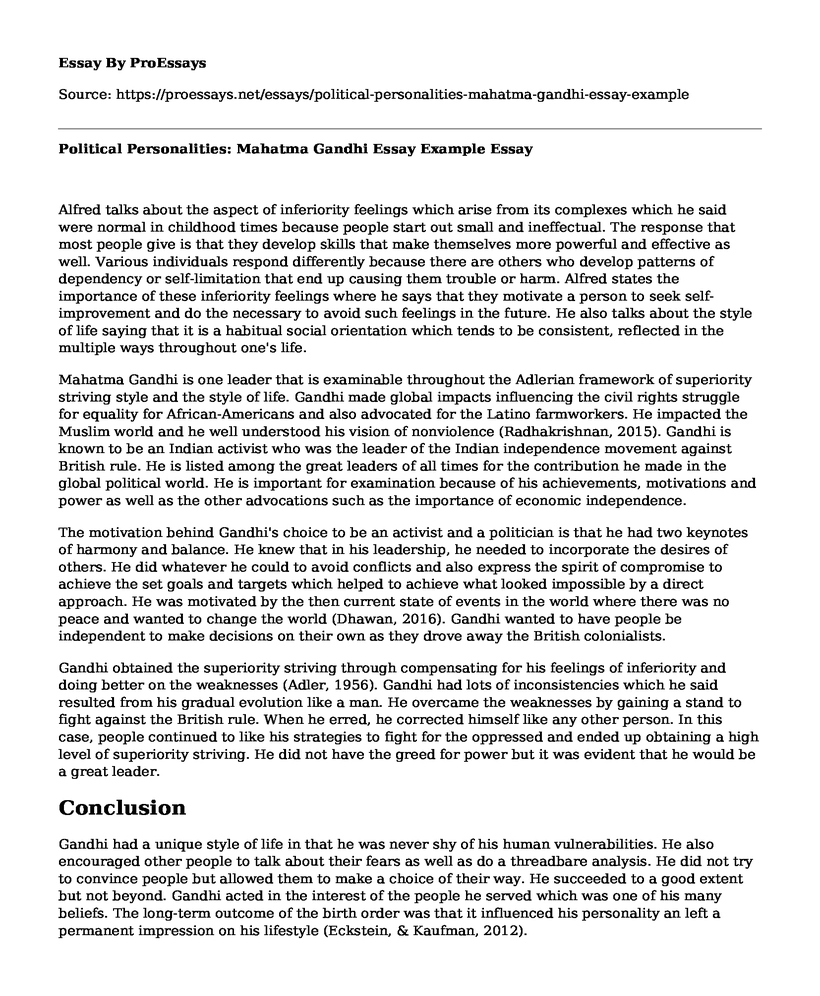Alfred talks about the aspect of inferiority feelings which arise from its complexes which he said were normal in childhood times because people start out small and ineffectual. The response that most people give is that they develop skills that make themselves more powerful and effective as well. Various individuals respond differently because there are others who develop patterns of dependency or self-limitation that end up causing them trouble or harm. Alfred states the importance of these inferiority feelings where he says that they motivate a person to seek self-improvement and do the necessary to avoid such feelings in the future. He also talks about the style of life saying that it is a habitual social orientation which tends to be consistent, reflected in the multiple ways throughout one's life.
Mahatma Gandhi is one leader that is examinable throughout the Adlerian framework of superiority striving style and the style of life. Gandhi made global impacts influencing the civil rights struggle for equality for African-Americans and also advocated for the Latino farmworkers. He impacted the Muslim world and he well understood his vision of nonviolence (Radhakrishnan, 2015). Gandhi is known to be an Indian activist who was the leader of the Indian independence movement against British rule. He is listed among the great leaders of all times for the contribution he made in the global political world. He is important for examination because of his achievements, motivations and power as well as the other advocations such as the importance of economic independence.
The motivation behind Gandhi's choice to be an activist and a politician is that he had two keynotes of harmony and balance. He knew that in his leadership, he needed to incorporate the desires of others. He did whatever he could to avoid conflicts and also express the spirit of compromise to achieve the set goals and targets which helped to achieve what looked impossible by a direct approach. He was motivated by the then current state of events in the world where there was no peace and wanted to change the world (Dhawan, 2016). Gandhi wanted to have people be independent to make decisions on their own as they drove away the British colonialists.
Gandhi obtained the superiority striving through compensating for his feelings of inferiority and doing better on the weaknesses (Adler, 1956). Gandhi had lots of inconsistencies which he said resulted from his gradual evolution like a man. He overcame the weaknesses by gaining a stand to fight against the British rule. When he erred, he corrected himself like any other person. In this case, people continued to like his strategies to fight for the oppressed and ended up obtaining a high level of superiority striving. He did not have the greed for power but it was evident that he would be a great leader.
Conclusion
Gandhi had a unique style of life in that he was never shy of his human vulnerabilities. He also encouraged other people to talk about their fears as well as do a threadbare analysis. He did not try to convince people but allowed them to make a choice of their way. He succeeded to a good extent but not beyond. Gandhi acted in the interest of the people he served which was one of his many beliefs. The long-term outcome of the birth order was that it influenced his personality an left a permanent impression on his lifestyle (Eckstein, & Kaufman, 2012).
References
Adler, A. (1956). Striving for superiority. The individual psychology of Alfred Adler: A systematic presentation in selections from his writings, 101-125.
Dhawan, G. (2016). The political philosophy of Mahatma Gandhi. Navajivan Publishing House (1951).
Eckstein, D., & Kaufman, J. A. (2012). The role of birth order in personality: An enduring intellectual legacy of Alfred Adler. Journal of Individual Psychology, 68(1), 60-74.
Radhakrishnan, S. (Ed.). (2015). Mahatma Gandhi. Jaico Publishing House.
Cite this page
Political Personalities: Mahatma Gandhi Essay Example. (2022, Oct 20). Retrieved from https://proessays.net/essays/political-personalities-mahatma-gandhi-essay-example
If you are the original author of this essay and no longer wish to have it published on the ProEssays website, please click below to request its removal:
- Essay Sample on Causes of World War II
- Public Policy Research and Recommendation Paper Example
- Effects of Monetary Policy in Hungary Essay Example
- Compare and Contrast Essay on Achilles and Odysseus
- Essay Sample on Theme of Slavery and Freedom in Works Written During the Antebellum Period
- Request for Extension: TESU Student Policy Explained - Essay Sample
- Anti-Chinese Sentiment and the 1870s Press: Expelling Chinese from the US - Essay Sample







